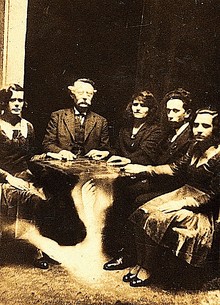Mood:
Topic: Education

Everyone knows that our school system, in general, is not giving our kids the basic reading, writing, ‘rithmatic and science skills needed to be competitive in the high-tech workforce of the upcoming generation (at least, that’s the general assumption, and we won’t argue it here).
But there’s much more to life than those basic subjects, and unless you have an exceptional teacher who is willing to break out of the mold, your child isn’t learning the crucial things he or she needs to learn in life.
Think about your own experience for a moment. When you got out of high school, did you know everything you needed in order to survive in life, let alone succeed? If you were lucky, you knew how to read and had some basic history and math skills, and if you were even luckier, you had good study habits that would serve you well in college.
But were you prepared for life? Most likely not, unless you had parents who did you that favor. In fact, many of us screwed up our early adult lives because we didn’t know those skills — and we’re paying the consequences now.
That’s a part of life, you might say, learning these lessons. But it’s also possible to prepare your child a bit before they go out on their own, and if we can’t get the schools to teach these skills, then let’s do it ourselves.
What follows is a basic curriculum in life that a child should know before reaching adulthood. There will probably be other skills you can add to this list, but at least it’s a starting point.
A note on how to teach these things: These subjects should not be taught by lectures or textbooks. They can only be taught by setting examples, by conversation, by showing, and by allowing the child (or teenager) to do these things on their own (with supervision at first). Once you’ve talked about the skill, showed your child how to do it, and let them do it under supervision a few times, give your child the trust to do it on his own, and to learn from his own mistakes. Check back every now and then to talk about what he’s learned.
Financial
** Saving. Spend less than you earn. It’s such a simple maxim, and yet very few young adults understand it or know how to follow it. Teach your child from a young age to put part of money he receives or earns in the bank. Teach him how to set a savings goal, and save for it, and then purchase whatever it is he was saving for.
** Budgeting. Many of us dread this task as adults, and suffer because of it, because we lack the understanding and skills necessary to make budgeting a breeze. Teach them simple budgeting skills, and what’s involved, and they won’t have problems as an adult. You could wait until teenage years to do something like this — but it’s a good thing because this shows them why basic math is necessary.
** Paying bills. Give them bills to pay and have them pay it on time, online or in the real world. Learn how to write a check, paper and online, and how to make sure that you’re never late with bills again — either pay them immediately or automatically.
** Investing. What is investing and why is it necessary? How do you do it and what are different ways of doing it? How do you research an investment? How does it compound over time? This is a good conversation to have with your teen.
** Frugality. This is something to teach them from an early age. How to shop around to get a good deal, to compare between products of different prices and quality, to make things last and not waste, to cook at home instead of eating out too much, to control impulse buying. When we go out and do a shopping spree, including before Christmas, we are teaching them just the opposite.
** Credit. This is a major problem for many adults. Teach them the responsible use for credit, and how to avoid it when it’s not necessary, and how to avoid getting into too much debt, and how to use a credit card responsibly.
** Retirement. Is it better to work hard and retire or to take mini-retirements throughout life? That’s a personal question, but your child should be aware of the options and the pros and cons of each, and how to do each. Why it’s important to start investing in retirement when you’re young, and how much of a difference that can make through compound interest. How to do it automatically.
** Charity. Why this is an important use of your money, and how to make it a regular habit. This should be not only a financial issue, but a social one. Show them how to volunteer their time and effort as well.
Thinking
** Critical thinking. One of the most important skills not taught in school. These days, we are taught to be robots, to listen to the teacher and not to question, to accept what we are told and not to think, to be good employees and to shut up. If you’re an employer, you might want your employees to be like this, and if you’re a politician, you might want your citizens to be like this. But is that how you want your child to be? An unquestioning, naive, ignorant citizen/employee/student? If so, carry on. If not, just start introducing the habit of questioning why? And the skill of find out the answer. And how to question authority — there is no one right answer. Conversation is a good way to accomplish this skill.
** Reading. Sure, we’re taught to read. But schools most often make this boring. Show your child the wonderful imaginative worlds there are out there. And show them how to find out about stuff in the world through the Internet, and how to evaluate what they read for credibility, logic, factualness.
Success
** Positive thinking. While critical thinking is an important skill, it’s also important to have a positive outlook on life. Sure, things may be screwed up, but they can be changed for the better. Find solutions instead of complaints. And most of all, learn to believe in yourself, and to block out negative self-thinking.
** Motivation. Learn that discipline isn’t the key to achieving a goal, but motivation. How to motivate yourself, different strategies, and how great it feels to achieve a goal. Start them with small, easily achievable goals, and let them develop this skill.
** Procrastination. It’s a problem we all deal with as adults (and even as kids). Now, I believe that there should be a time for goofing off, being lazy, and having fun. But when there’s something to do that we really need to do, how do we get ourselves to do it? Learn the reasons behind procrastination, and how to address them. How to beat procrastination.
** Passion. One of the most important ways to be successful is to find something you’re passionate about, and do that for a living. Your child won’t know the answer at a young age, but you should show her how to find her passion and how to pursue it, and why that’s important.
Social
** Anti-competition. As kids, we’re taught how to be competitive. In the adult world, that’s how we behave. And that results in back-stabbing, undercutting, feelings of resentment, and other life-affirming things like that. Instead, teach your child how there is room for many people to be successful, and how you’re more likely to be successful if you help others to be successful, and how they’ll help you in return. Learn that making friends and allies is better than making enemies, and how to do that. Learn cooperation and teamwork before competition.
** Compassion. Not taught in the schools at all. In fact, instead of teaching children how to empathize with others and try to ease their suffering, our schools often teach children to increase the suffering of others. Learn to put yourself in the shoes of others, to try to understand them, and to help them end their suffering.
** Love. Compassion’s twin brother, love differs only in that instead of wanting to ease the suffering of others, you want their happiness. Both are crucial.
** Listening. Are our children taught how to listen in school? Or how to talk at someone. Perhaps that’s why many adults don’t have this critical skill. Learn how to truly listen to someone, to understand what they’re saying, to empathize.
** Conversation. Goes hand-in-hand with listening, but the art of conversation is something that isn’t taught in school. In fact, kids are taught that conversation is bad in most cases. But in most cases, a conversation is what is needed, not a lecture. This is an extremely important social skill that should start in the home. Learn to converse with your child instead of talk at him.
Practical
** Auto. Why cars are needed (no, not to look cool), how to buy a practical car, how to take care of it. How the engine works, what might break down, and how it’s fixed. Should be taught to both boys and girls (that should be obvious, but I had to say it).
** Household. How to fix things around the house and keep things maintained. Plumbing, electricity, heating and cooling, painting, roofing, lawn, all that good stuff. The tools and skills necessary to do just the basic maintenance and repairs. And how to know when to call a professional.
** Cleaning. Too many adults grow up without knowing how to do laundry, to clean a house properly, to keep the house clean and uncluttered, to have a weekly and monthly cleaning routine. Teach your child all these things instead of just telling her what to do.
** Organization. How to keep paperwork organized, how to keep things in their place, to to keep a to-do list, how to set routines, how to focus on the important tasks.
Happiness
** Be present. For some reason, this extremely important skill is never taught to us when we’re kids. In truth, the younger we are, the more natural this skill is. As we get older, we start thinking about the future and the past, and the present seems to slip away from us. Some skills for living in the present would go a long way.
** Enjoy life. Kids don’t have much of a problem with this, but some awareness of its importance and how to do it, even as an adult, would be helpful. Set a good example of this, and your kids will follow.
** Find purpose. Whether this is a higher religious purpose, or the purpose of making your family happy, or the purpose of finding your calling, having a purpose in life is extremely important. Teach your children the importance of this and show how to do it yourself.
** Develop intimate relationships. The best way to teach this is to develop an intimate relationship with your child, and model it with your spouse or other significant other (within appropriateness). Teach them the skills for developing these types of relationships, talk about the importance of it, and how to get through the bumpy parts as well. There are bad times in every relationship, but with the right skills of communication, empathy and compromise, they can get through them.
by Leo Babauta
Article Source - dailygood.org






